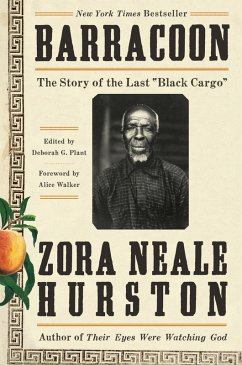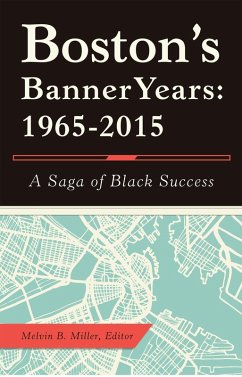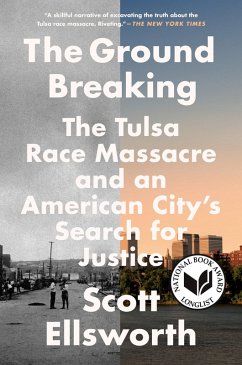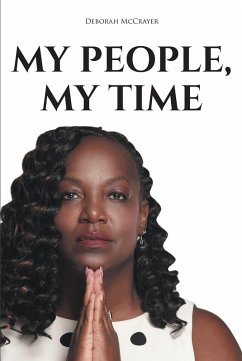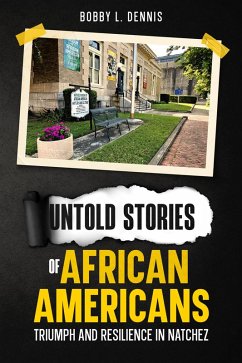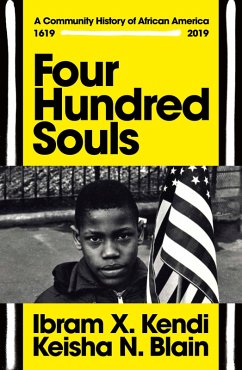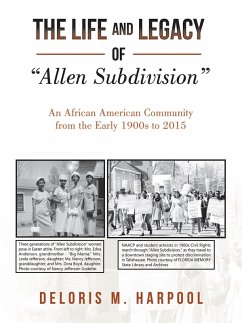
The Life and Legacy of "Allen Subdivision" (eBook, ePUB)
An African American Community from the Early 1900S to 2015
Versandkostenfrei!
Sofort per Download lieferbar
2,99 €
inkl. MwSt.
Weitere Ausgaben:

PAYBACK Punkte
1 °P sammeln!
The Life and Legacy of Allen Subdivision describes an African American community from its inception, where over ninety bustling African American-owned businesses emerged. Beginning in the early 1900s, in spite of segregation, discrimination, disparities in economic opportunities, and other Jim Crow practices, this little-known community in Tallahassee, Florida, thrived and produced African Americans and descendants of remarkable success. Through personal accounts of residents, oral history of neighborhood elders and official historical records, the author illuminates alluring messages about th...
The Life and Legacy of Allen Subdivision describes an African American community from its inception, where over ninety bustling African American-owned businesses emerged. Beginning in the early 1900s, in spite of segregation, discrimination, disparities in economic opportunities, and other Jim Crow practices, this little-known community in Tallahassee, Florida, thrived and produced African Americans and descendants of remarkable success. Through personal accounts of residents, oral history of neighborhood elders and official historical records, the author illuminates alluring messages about the value of this modest neighborhood in the American landscape.
Inspired by 2008 city and county plans for urban redevelopment, including commemorative markers in the south central section of Tallahassee, this work is rare. With the launching of the civic project, it became evident that no deep-dive review of the cherished 'Allen' neighborhood had ever been published or made available to policy makers and civic planners. The untold, rich legacy of the once significantly independent community and its effect on its sons and daughters and their descendants required action. Deloris M. Harpool, who grew up in the humble neighborhood, accepted the challenge to document the unique character and consequential effects of her treasured home place.
The book is enriched with a fascinating blend of humorous and yet sobering reported experiences reminiscent of life in 'Allen.' It presents early developers and environmental conditions, superstitions, myths and traditions that existed as a part of the neighborhood experience. It reveals medical home remedies, home-grown foods, 'make do' meals, meatless sandwiches, make-shift toys and games, favorite sweet treats, jokes, nicknames, coping strategies, fun experiences, and other aspects of life common to many individuals raised in African American communities.
This rendering emphasizes the significance of the role of neighborhood churches, Black-owned businesses and an informal, yet integral relationship with Florida A&M University. It describes loyalty and loving relations among residents, collective discipline and protection of children, and sage advice of the elders in meeting social and economic challenges. It further describes the community's little-known involvement in the civil rights movement and the achievement of 'Allen' residents. As a bonus, this depiction offers a roadmap for acceptance of ethic experiences and contributions in civic planning.
Discover how an iron-clad, close-knit village enabled individual members to achieve lasting success and the lessons we can learn from its legacy and social determinants of success.
"The author... takes me down an entertaining and amusing memory lane...She reminds me of how blessed I am to have grown up in a similar community. This work speaks to the important role such a community played in the development of resilient, productive and contributing African American citizens."
-Barbara R. Cotton, D.A., history professor emeritus, Florida A&M University, Tallahassee, Florida
"In this book, Harpool illustrates that it truly took a village, including once thriving neighborhood businesses, to produce the fine caliber of African American leaders of today. This type of history is lost in many communities. Her work documents a great legacy and preserves history for future generations."
-Dianne Williams-Cox, commissioner, City of Tallahassee, Florida
Inspired by 2008 city and county plans for urban redevelopment, including commemorative markers in the south central section of Tallahassee, this work is rare. With the launching of the civic project, it became evident that no deep-dive review of the cherished 'Allen' neighborhood had ever been published or made available to policy makers and civic planners. The untold, rich legacy of the once significantly independent community and its effect on its sons and daughters and their descendants required action. Deloris M. Harpool, who grew up in the humble neighborhood, accepted the challenge to document the unique character and consequential effects of her treasured home place.
The book is enriched with a fascinating blend of humorous and yet sobering reported experiences reminiscent of life in 'Allen.' It presents early developers and environmental conditions, superstitions, myths and traditions that existed as a part of the neighborhood experience. It reveals medical home remedies, home-grown foods, 'make do' meals, meatless sandwiches, make-shift toys and games, favorite sweet treats, jokes, nicknames, coping strategies, fun experiences, and other aspects of life common to many individuals raised in African American communities.
This rendering emphasizes the significance of the role of neighborhood churches, Black-owned businesses and an informal, yet integral relationship with Florida A&M University. It describes loyalty and loving relations among residents, collective discipline and protection of children, and sage advice of the elders in meeting social and economic challenges. It further describes the community's little-known involvement in the civil rights movement and the achievement of 'Allen' residents. As a bonus, this depiction offers a roadmap for acceptance of ethic experiences and contributions in civic planning.
Discover how an iron-clad, close-knit village enabled individual members to achieve lasting success and the lessons we can learn from its legacy and social determinants of success.
"The author... takes me down an entertaining and amusing memory lane...She reminds me of how blessed I am to have grown up in a similar community. This work speaks to the important role such a community played in the development of resilient, productive and contributing African American citizens."
-Barbara R. Cotton, D.A., history professor emeritus, Florida A&M University, Tallahassee, Florida
"In this book, Harpool illustrates that it truly took a village, including once thriving neighborhood businesses, to produce the fine caliber of African American leaders of today. This type of history is lost in many communities. Her work documents a great legacy and preserves history for future generations."
-Dianne Williams-Cox, commissioner, City of Tallahassee, Florida
Dieser Download kann aus rechtlichen Gründen nur mit Rechnungsadresse in A, D ausgeliefert werden.






